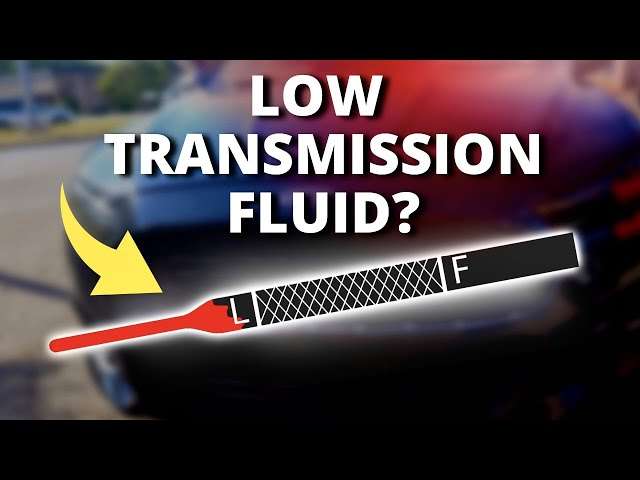Discovering that your car’s transmission fluid is empty can be a stressful situation‚ potentially leading to serious damage to your vehicle. Transmission fluid is crucial for lubricating the intricate components within your transmission‚ ensuring smooth gear changes and preventing overheating. Understanding the potential causes of low transmission fluid and knowing the correct steps to take can help you mitigate damage and get your car back on the road safely. This article will guide you through the essential steps to take when facing this problem‚ empowering you to make informed decisions about your vehicle’s health.
Understanding Transmission Fluid and its Importance
Transmission fluid acts as a lubricant and coolant within your car’s transmission system. A leak or excessive consumption can lead to low levels‚ causing significant operational issues.
Functions of Transmission Fluid
Here’s a breakdown of what transmission fluid does:
- Lubrication: Reduces friction between moving parts.
- Cooling: Dissipates heat generated during operation.
- Hydraulic Pressure: Enables gear shifting.
- Cleaning: Removes debris and contaminants.
- Protection: Prevents corrosion and wear.
If you suspect your transmission fluid is low‚ it’s crucial to act quickly and carefully. Proper diagnostics and immediate action can prevent further damage.
Immediate Steps to Take
Follow these steps to assess the situation:
- Check the Fluid Level: Use the dipstick (usually marked “Transmission Fluid”) to check the fluid level. Refer to your owner’s manual for the correct procedure.
- Look for Leaks: Inspect the area under your car for any signs of leaks. Pay attention to the transmission housing and lines.
- Do Not Drive: If the fluid is completely empty‚ avoid driving the car. Driving with no transmission fluid can cause severe and irreversible damage.
- Add Fluid (Temporarily): If the level is just low‚ you can add the correct type of transmission fluid to get you to a mechanic. Consult your owner’s manual for the correct type.
Identifying Potential Causes
Understanding the cause of the low fluid is critical to prevent future problems. Common culprits range from simple leaks to more complex mechanical issues.
Common Causes of Low Transmission Fluid
Here’s a table summarizing possible causes:
| Cause | Description | Severity |
|---|---|---|
| Leaks | Damaged seals‚ gaskets‚ or lines. | Variable ⎯ can range from minor to severe. |
| Worn Transmission Components | Internal wear leading to fluid consumption. | Severe — indicates significant transmission problems. |
| Overheating | Excessive heat causing fluid to break down and evaporate. | Moderate — can lead to further damage if not addressed. |
FAQ About Transmission Fluid
Here are some frequently asked questions regarding transmission fluid:
Frequently Asked Questions
- Q: How often should I check my transmission fluid?
- A: It’s recommended to check your transmission fluid monthly‚ or at least every other oil change.
- Q: What type of transmission fluid should I use?
- A: Always use the type of transmission fluid specified in your owner’s manual. Using the wrong fluid can damage your transmission.
- Q: Can I add transmission fluid myself?
- A: Yes‚ you can add transmission fluid yourself‚ but be sure to use the correct type and avoid overfilling.
- Q: How do I check my transmission fluid?
- A: Usually‚ there is a dipstick labeled transmission fluid‚ pull the dipstick out and wipe it clean. Then place it back in and pull it out again to read the level.
Addressing an empty transmission fluid situation requires a calm and methodical approach. By carefully checking the fluid level‚ identifying potential leaks‚ and avoiding driving the vehicle in a severely depleted state‚ you can minimize the risk of further damage. It’s essential to consult with a qualified mechanic as soon as possible for a thorough inspection and repair. Ignoring the problem could lead to costly transmission repairs or even a complete transmission failure. Remember‚ preventative maintenance‚ including regular fluid checks and scheduled servicing‚ is the best way to ensure the long-term health and performance of your vehicle’s transmission system. Taking proactive steps will save you money and keep you safely on the road.
Choosing the Right Mechanic
So‚ you’ve identified a potential problem and need professional help. But how do you select the right mechanic for the job?
Questions to Ask Potential Mechanics
Before entrusting your car to someone‚ shouldn’t you ask some crucial questions?
- Are they experienced in transmission repairs‚ specifically with your vehicle’s make and model?
- Do they offer a warranty on their work‚ guaranteeing the quality of their repairs?
- Can they provide a detailed explanation of the problem and the proposed solution‚ without using overly technical jargon?
- Will they provide a written estimate before starting any work‚ ensuring transparency and avoiding unexpected costs?
Preventative Maintenance for a Healthy Transmission
Wouldn’t it be better to prevent transmission problems altogether? What steps can you take to keep your transmission running smoothly for years to come?
Simple Steps for Long-Term Transmission Health
Consider these preventative measures. Are you doing enough?
| Step | Description | Frequency |
|---|---|---|
| Regular Fluid Checks | Checking the transmission fluid level and condition. | Monthly‚ or with every oil change. |
| Scheduled Fluid Changes | Replacing old‚ degraded transmission fluid. | As recommended in your owner’s manual. |
| Avoiding Hard Acceleration | Reducing strain on the transmission. | Always. |
| Proper Towing Practices | Following weight limits and using appropriate equipment. | When towing. |
FAQ: Advanced Transmission Topics
Still have questions? Let’s dive into some more complex issues. Are you ready for the advanced class?
Advanced FAQs
- Q: What are the signs of a failing torque converter?
- A: Slipping gears‚ shuddering during acceleration‚ or stalling – are these familiar symptoms?
- Q: What is the difference between automatic and manual transmission fluid?
- A: Are they interchangeable? Definitely not! Should you know the specific type your car requires? Absolutely.
- Q: Can I use a transmission fluid additive?
- A: Do they really improve performance‚ or are they just a waste of money? Could they even cause harm?
- Q: How do I know if my transmission needs a rebuild versus a replacement?
- A: Is rebuilding a more cost-effective option? What are the long-term implications of each choice?
So‚ faced with an empty transmission fluid reservoir‚ aren’t you glad you’re now armed with the knowledge to take decisive action? Have you learned the importance of regular checks and preventative maintenance? Don’t you agree that understanding potential causes and knowing how to choose a reliable mechanic can save you significant money and stress? And isn’t it comforting to know that by addressing the issue promptly and thoroughly‚ you’re not only protecting your car but also ensuring your safety on the road? Ultimately‚ isn’t proactive car care a responsible and rewarding investment?


